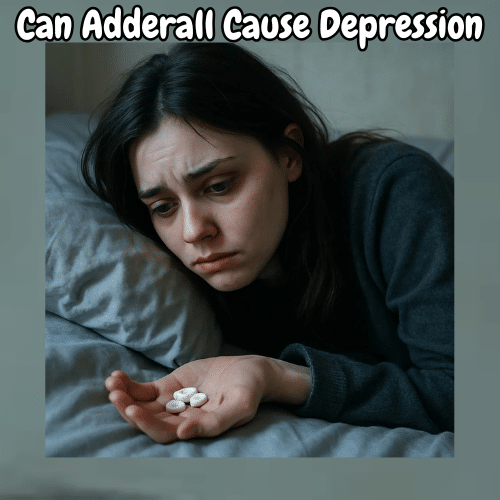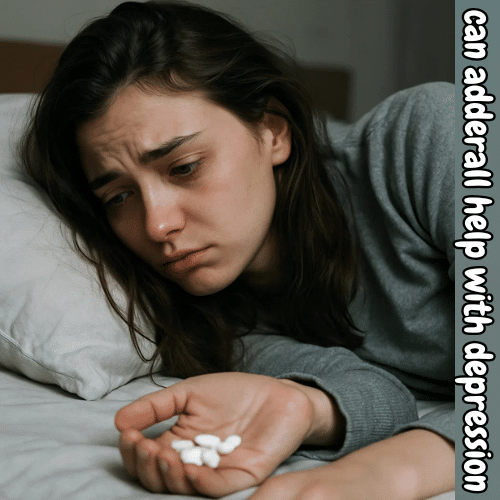Topics Covered in This Guide
- Adderall affects brain chemicals, impacting both focus and mood.
- Some users may feel sad, irritable, or depressed, especially with high doses.
- Stopping suddenly can trigger low mood or withdrawal symptoms.
- At-risk groups: non-ADHD users, misuse, anxiety, or bipolar disorder.
- Safer options include therapy, non-stimulant meds, and lifestyle changes.

Introduction
A lot of people question does Adderall causes depression. This matters for adults using it for ADHD or narcolepsy, and for families who experience mood variations in loved ones. Basically, adderall disturbs brain chemicals that also control mood, so the two are connected. Adderall is a prescription drug that supports concentration and attentiveness. However, some people say that they feel sad, easily irritated or even depressed after taking it. Others wonder if it could really lift mood, and can Adderall help with depression, as it offers energy.
This content shares what studies and actual stories show about the dangers, symbols to watch for and safer techniques to treat attention complications without disturbing mental health.
What Is Adderall and How Does It Work?
Adderall has two key ingredients: amphetamine and dextroamphetamine. These are stimulants that increase certain chemicals in the brain known as dopamine and norepinephrine. More dopamine can assist you in focusing better, staying aware and feeling more awake. This is why doctors offer Adderall to people with ADHD or narcolepsy. But the same brain chemicals also disturb mood. So, some people question whether Adderall can help with depression or might improve their mood.
At the same time, changes in these chemicals can sometimes cause low mood, which is why people also wonder if Adderall can make you depressed.
Can Adderall Cause Depression?
Research displays that Adderall, a stimulant, can sometimes change mood. One common worry is Adderall side effects and depression. This can happen due to a few reasons:
Brain chemicals drop: When the medicine wears off and dopamine and norepinephrine go down, which can make you feel unhappy or low.
Too much stimulation: The high levels of these chemicals for a long time can fatigue the brain and cause irritability or unhappiness.
Personal differences: Your genes, anxiety or existing mood complications can change how Adderall disturbs you.
Some reports and FDA data display people feeling low after taking Adderall, but not everybody has these side effects. Lots of people stay motivated without mood problems.
When Adderall Use Turns Risky
Adderall can be unsafe in certain situations. Taking it without a prescription, using more than suggested or using it only for fun can disturb your mood. People with anxiety, bipolar disorder or a family history of depression may be more sensitive. Taking high doses, using it frequently or for a long time can create the “come-down” poorer, causing unhappiness or irritability. Feeling exhausted after a dose is usual, but continuing sadness, loss of interest in everyday life or hopeless feelings may be a sign of real depression and should be checked by a doctor.
Can Adderall Make You Depressed Over Time?
Using Adderall for a long time can disturb your mood. Some people want higher doses over time to get the same concentration or energy. It can create emotions that feel flat or numb. Discontinuing Adderall abruptly can cause Adderall withdrawal depression. Symptoms may include feeling very weary, grumpy, having difficulty sleeping or feeling very sad or hopeless. How strong these feelings are and how long they last depend on the dose and how long the medicine was taken. Recovery can take days or a few weeks.
Signs & Symptoms to Watch For
Feeling Sad or Empty
Feeling unhappy, empty, or desperate for a long time can be a symptom of depression. While taking Adderall, these feelings might start gradually or get worse, particularly when the medicine wears off. This low mood can disturb your everyday life, relationships, and work or school.
Losing Motivation
If you stop feeling motivated or drop interest in things you typically enjoy, then it could be a threatening sign. Some people feel more concentrated and energetic at first on Adderall, but over time, motivation can drop. This can disrupt work, social life, and self-care, so it’s essential to consult a doctor if this happens.
Irritability or Mood Swings
Getting easily irritated, angry or having unexpected mood changes can happen while taking Adderall. These variations may be caused by the medicine, its “come-down” effect, or a current mood problem. Noticing when moods change, like feeling poorer in the afternoon or evening, can help your doctor understand the cause.
Sleep Problems
Adderall can make it tough to sleep. You might worry about falling asleep, remaining asleep or waking up feeling exhausted. Some people may sleep too much but still feel tired. Poor sleep can disturb mood and may make depression worse.
Suicidal Thoughts or Urges to Harm Yourself
If you think about harming yourself or suicide, then take it seriously. Adderall can create such mood swings that are worse in some people. You should get help immediately from a doctor, mental health expert or crisis helpline. Getting help timely manner can keep you safe and help adjust your treatment if required.
Side Effects vs. Existing Conditions
It can be tough to know if symptoms are from Adderall or a pre-existing mood issue. Side effects typically start after beginning or increasing the dose and can transform with medication. Mood disorders usually stay the same no matter what. Having a diary of your symptoms, when they happen, and how strong they are can help your doctor understand the cause and select the best treatment.
Research & Case Studies
Research and case studies display different effects of how Adderall affects mood. Some studies, with those from PubMed and PMC, display that stimulants and mood disorders can be connected. Some people may feel more depressed or have worse moods once taking Adderall for numerous months. Psychiatric case reports offer actual examples of people whose mood worsened with long-term use.
On the other hand, some reports display the opposite. In unusual situations, doctors have carefully used Adderall to support people with depression that did not get better with usual antidepressants. This continually happens under close supervision. These samples display that Adderall can disturb people’s mood in diverse ways. For example, it can make it worse for some, but help others in particular cases.
Managing Depression Linked to Adderall
If Adderall is making you feel unhappy or low, then don’t change your dose on your own. Consult your doctor first, as stopping swiftly can make symptoms worse. Have an eye on how you feel by checking in with yourself, writing it down or using a mood tracker. Request your doctor about other techniques to treat ADHD, like non-stimulant medicine, therapy or healthy habits such as exercise, good sleep and managing stress. These steps can help protect your mood and make your mind feel better while taking ADHD medicine.
Alternatives & Safer Approaches
Non-Stimulant Medications: If you are concerned about Adderall and mental health, then non-stimulant medicines can be a safer option. Medicines like Strattera (atomoxetine) or some antidepressants like Wellbutrin may assist you in focusing better, feeling more stable and managing your mood. They typically have fewer risks of dependency or strong mood swings. Each time, take them under a doctor’s guidance.
Therapy and Counseling: Therapy can actually help with Adderall and mental health worries. Cognitive Behavioral Therapy (CBT) teaches methods to switch stress, stay concentrated, and manage feelings. Counseling also enables you to build healthy everyday habits, stop mood swings, and feel more emotionally balanced over time.
Lifestyle Changes: Simple lifestyle changes are key to Adderall and mental health. Exercise habitually to increase focus and mood, eat healthy foods, and follow a regular sleep timetable. Doing things like mindfulness or stress management can help steady your emotions and decrease the need for medicine while helping your brain and mood stay healthy, obviously.
Conclusion
In conclusion, Adderall can benefit people with ADHD and narcolepsy by refining focus and alertness. Lots of people feel more organized and able to switch between their everyday tasks. As it disturbs the same brain chemicals that control mood, therefore, some people may feel unhappy, down or even develop depression. Whether it helps or worsens your mood depends on your body, dose, how long you use it and your health history. Each time, talk to a doctor before beginning or changing your dose. Must watch your feelings closely and get help immediately if you feel very sad, hopeless or have thoughts of harming yourself.
FAQs
Does Adderall help or hurt depression?
It can do equally. Some people feel better, some feel poorer.
Is depression a withdrawal symptom from Adderall?
Yes, stopping Adderall quickly can make you feel depressed.
Can combining Adderall with antidepressants help?
Sometimes, but only if a doctor says it’s safe.
Can Adderall cause depression?
Yes, Adderall can help with depression in certain, limited circumstances, but it is not a standard treatment. A doctor might prescribe it “off-label” meaning for a use other than its primary purpose of treating ADHD and narcolepsy for individuals with treatment-resistant depression. However, it comes with risks and is often used in combination with antidepressants, not alone.
Can Adderall cause depression in adults?
Yes, adults can get depressed from Adderall.
Can Adderall cause depression in teens?
Yes, teens can also get depressed.
Can Adderall cause depression in women?
Yes, women can also be affected.
Can Adderall cause depression in children?
Yes, children can also feel depressed.
Can Adderall cause depression or withdrawal symptoms?
Yes, feeling depressed is usual when ending Adderall.
Why does Adderall cause depression in some people?
It changes brain chemicals that control mood, which can make some people unhappy.
Can Adderall cause depression long-term?
Yes, using it for a long time may raise the chance of depression for some people.



Recent Comments